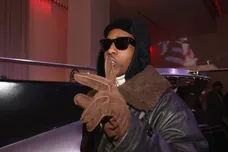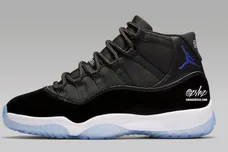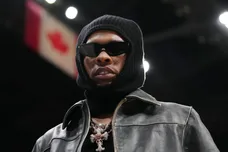Influence tends to have an expiry date when it comes to the lightning-paced world of hip-hop. Despite the renown of both Kurtis Blow or Doug E. Fresh, as trailblazers within the genre of hip-hop, you’d be hard-pressed to find any sort of trace amount of their sound in modern music. Likewise, as you enter today’s vibrant but commercially-minded world, even the storied careers of lyrical titans that set the pace in the '90s can often recede from view. Yet, while sounds and styles can become old-hat, it's an attitude, an idea, that can transcend generations.
25 years on from the release date of his exhilarating, double-disc masterpiece, All Eyez On Me, the philosophies of the late, great Tupac Amaru Shakur are still at the forefront of the genre, ensuring that while he’s long gone in a physical sense, his aura is immortal. Seen as both an introspective thinker and a warrior-poet, Pac’s ability to use his words, whether on wax or in interviews --to shed light on social inequity, contemplate matters of the soul, or delve deep into the human experience-- presented a man that was wise beyond his years.
Throughout his tragically short life, Pac carried himself in a way that has often been portrayed as authentic to a fault, but accounted for the dueling sides of his outlook. Or, as longtime Tupac superfan Jhené Aiko put it to MTV, "He was so contradictory to people, but to me, he was just human and not afraid to express himself."
Al Pereira/Michael Ochs Archives/Getty Images
While the posthumous projects and overt homages such as those seen in the recent work of Polo G or NLE Choppa, certainly help introduce Pac to new generations of fans, hip-hop truly keeps Tupac alive by virtue of the fact that many of the genre's most vital, groundbreaking and at times, controversial artists have channeled his unique brand of defiance in their own way.
Tupac was capable of thoughtfully advocating for systemic change in one moment, and gleefully spitting at reporters in the next, but the common thread that binds our perception of Tupac together is that he refused to conform with the rigged system that he saw around him. All the while, he used his platform to convey the unfiltered stories of those fighting against a world that wasn’t made with their prosperity in mind.
Those artists who are active within conscious hip-hop, and perhaps even those artists whose success is an act of rebellion in itself, often shape their music by this key tenet of Pac's attitude -- a refusal to downplay the experiences that shaped him or to deceive.
Hailing from Baton Rouge, Louisiana, one rapper who’s followed Pac's doctrine of carrying yourself without apologies, compromise, or censorship, is none other than Boosie Bad Azz. Since he first came out of the gate at 17, the former Lil Boosie has valued realness in his songs and public statements, above all else. Eventually, going as far as to become one of the many MCs to dub themselves the modern-day equivalent of Shakur in the lead-up to his 2017 project, Boopac.
“I’m this generation’s Tupac,” he told Vlad TV. “[I make that] real music that feels like it’s brought out to your household, like he your cousin. When you buy that motherfucker, you gonna think shit, this motherfucker touched me just like Tupac touched me. [It] makes you feel like you know somebody. Fans come up to me crying like ‘you changed my life’, you got me through this. That’s what Tupac did for me. Tupac motivated me to want to rap and tell my story.” Elements of Pac’s “Me Against The World” ethos are clearly detectable through Boosie’s commitment to lead both his music and life with honesty; whether he suffers for it or is applauded for it. But make no mistake, he’s not the only one who has managed to replicate that intimate connection, with an audience who embraces them just as much for their flaws and missteps as they do for the strength of their convictions.
Operating from the same patch as Boosie, the emotional rawness and vivid ghetto storytelling of NBA Youngboy is so pronounced that Trippie Redd once deemed him to be Shakur re-incarnated, while 21 Savage’s desire to uplift his community with one hand and strike fear in the hearts of his enemies with the other, mirrors Pac’s mantra of ‘I’m not a threat to you unless you’re a threat to me.” Heading down to Florida, Kodak Black’s numerous legal setbacks, contemplative output, and ongoing battle to leave the darkness behind him, all echo many of the same elements that made Tupac into one of the most compelling figures the genre has ever produced.
Ron Galella/Ron Galella Collection/Getty Images
Despite their geographical differences and the circumstances that molded them into who they are, what these artists all have in common is an undeniable inner conflict. And if there was ever a role model for those who’ve battled with the opposing sides of their nature in hip-hop, it’s Tupac.
Seen as the embodiment of the Gemini zodiac sign in which two opposing personalities are forced to coexist, Tupac’s duality has often been miscategorized as a case of him being seduced by the gangster lifestyle that signing to Death Row Records afforded to him. But in one of his final public interviews, Pac suggested that people simply couldn’t handle him exhibiting the full breadth of his character.
“All of us as human beings have a dominant and a quiet side,” he relayed to Gang Related co-star Jim Belushi. “I am young and I'm black and I'm from the hood, so you got all these different facets. But I'm an artist, you know what I mean? And I'm hungry for knowledge. There's no pigeon hole to put me in, so they'd rather just make it look like I'm crazy."
More than decades later, we’re still in a position where young rappers are similarly typecast as and can be demonized instantly when they slip up. As a result, this inner complexity that Pac attributed to himself is something that misunderstood MCs see reflected in themselves-- and this same complexity actively empowers artists to improve their world without diluting who they are.
In each and every dispatch to the public, Pac put his insecurities, fears, and innermost thoughts out to the world in an unbridled fashion. Consequently, when artists such as Kendrick Lamar, J.Cole and YG discussed why the late icon impacted them, Pac’s willingness to show himself as “The Rose That Grew From Concrete,” “dirty stems” and all, stands out as what made him an inspiration.
"It’s just the truth," Cole told Blurred Culture. "Even as a seven-year-old kid, I could hear Pac's early albums and feel the truth."
Meanwhile for hip-hop’s first Pulitzer Prize winner, Kendrick Lamar-- who ended up staging a full conversation with his hero on To Pimp A Butterfly’s “Mortal Man” after initially planning to name the album after him-- his attempts to emulate how Pac made audiences ‘feel’ his words would soon make K. Dot into a voice for a generation that’s rising up against injustice.
Here, one of the most positive elements of Pac’s attitude that’s permeated through to today’s artists comes to the fore. Pac has indirectly told artists of all backgrounds and with all manner of imperfection, that they have what it takes to be a leader.
Kevin Mazur Archive/WireImage/Getty Images
"I think the spirit of Tupac was Nipsey... the seed that he planted because he didn't rap like him, but he moved like him," the West Coast legend told the Breakfast Club in August 2019. "The way he was lovable but he was gangster at the same time. The way he was about the kids, the community work. That’s the same thing Tupac was about."
Consider that in one of his most famous interviews, Pac declared: "I might not change the world, but I will spark the brain that will." The degree to which artists have transplanted Pac's attitudes into the 21st century suggests that this icon actually sold himself short. Without even taking into account how his flow has influenced hundreds of MCs, or the infinite eyes and ears that he brought to the genre, the greatest gift that Pac ever gave to his hip-hop descendants is perhaps an attitude. By living and working as his authentic self, Tupac taught the generations to come that they can operate under the exact same principles, and leave a definitive mark of their own.









